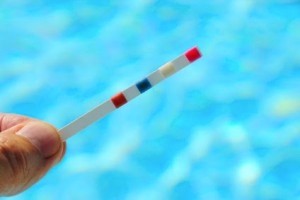Maintaining a safe pool is about more than just good chlorination practices and fishing out the occasional leaf or tree branch. Although a low maintenance system like the Accu-Tab® Chlorination system can be a great way to add the proper amounts of chlorine to your pool to stave off bacteria and other contaminants, undesirably high pH levels can result in scale deposits and restricting water flow.
"Swings in pH can result in considerable pool damage,” says Westlake Water Solutions’s senior research associate, Dr. Stanley Pickens. “Metal fixtures or head exchangers may be corroded and corrosion products can stain plaster. Control of pH can also be important in keeping chlorine working properly. Extremes of pH can be irritating or damaging to skin and eyes.”
Maintaining an alkalinity level in the right range can play a big role in keeping the pH under control—which is why regularly testing your pool’s alkalinity is one of the best, proactive decisions a pool operator can make.
What is Total Alkalinity?
Total alkalinity is a measurement that defines the ability of water to stabilize its pH levels amid natural fluctuations. Why is alkalinity so important for pool managers to understand?
When your pool’s total alkalinity is too low, its pH level can become unstable, resulting in unwanted rises or dips in the pH level. If your pool’s pH levels are too low, it can corrode fixtures, ultimately resulting in staining of your pool’s walls, in addition to the corrosion damage itself. Low or high pH extremes can irritate swimmers’ eyes and nasal passages, and cause dry skin. Low pH in conjunction with high combined chlorine levels can give rise to volatile chloramines, which are toxic and irritating to eyes and respiratory tracts, in addition to being malodorous. On the other hand, when the total alkalinity level is too high, the pH level will also rise, allowing the formation of scale deposits. So how can pool operators best achieve pH and alkalinity levels that are just right?
How Do I Test My Pool’s Total Alkalinity?
Regularly testing your pool’s alkalinity level is an essential method for ensuring the effectiveness of your Accu-Tab® Chlorination System and for protecting your pool from dangerous irritants. The most common way to test your pool’s total alkalinity is with total alkalinity testing strips, like the ones from Taylor Technologies. This simple, inexpensive method involves quickly dipping the testing strip into the pool and waiting about 15 seconds before reading the results. Here, careful handling and storage of the test strips is essential—click here for a more complete guide to using alkalinity test strips.
There are also some alternative methods of alkalinity testing, all of which have their unique benefits. Colorimetric tests, involving portable colorimeters and test reagents, may be a little bit more expensive, but are ideal for facilities with multiple people testing the pool water. This is good for facilities that have variable or uncontrolled lighting conditions and have a need or desire for greater precision.
With the titration method of alkalinity testing, poolside drop-count titrations and laboratory titrations with burettes can be used to determine alkalinity. There are also titration methods or kits for hardness and for various other water quality parameters. You can learn more about the different methods and advantages of the titration method here.
Of course, water quality doesn’t start and end at alkalinity. Pool operators everywhere should also become familiar with the Langalier Saturation Index, a formula which can help determine whether the combination of pH, bicarbonate alkalinity and calcium hardness is balanced or within a range that could lead to corrosion or scaling. By using the pool’s alkalinity measurements and other factors, the “SI” (as it is commonly referred to) takes chemical measurements and temperature into account to measure pool water’s potential for internal corrosion and scale deposits. You can calculate your water’s Langelier Saturation Index using this online calculator.
Click here (PDF) to learn more about how an Accu-Tab chlorinator can help sanitize the water in your commercial pool, spa, or water park. You can also watch an interactive demo here. Interested in Accu-Tab? Click here to send a message to our team or call us at 800-245-2974.

